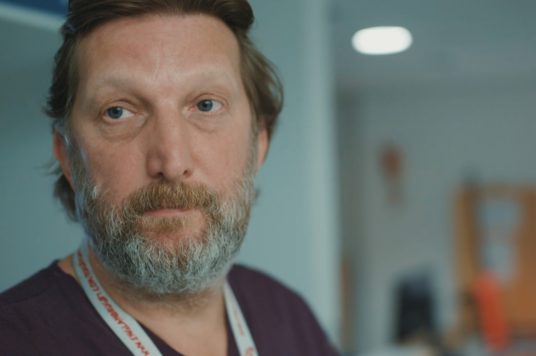C4 Emergency meet the team: Timothy Bishop, Consultant Orthopaedic Surgeon
Emergency series two continues at 9 pm on Channel 4 tomorrow night (Tuesday 22 August).
We caught up with those in #TeamStGeorges that star on the show. Meet Tim Bishop, Consultant Orthopaedic Surgeon and Clinical Director for our surgical directorate.
Describe your role – what’s involved in a typical day, if such a thing exists?
Some of the beauty of the job is that every day is different even if the activity is the same. Each patient is unique even if their condition is similar. Each operation even if the same for the surgeon is a unique episode for the patient and no operation is ever quite the same. Obviously working in a trauma setting adds an extra level of uncertainty or variety depending on your viewpoint.
Describe the cases you were involved in during this series of Emergency?
I was involved in the care of a young rugby player who had a traumatic dislocation of his knee with multi-ligament injury. He played for a vegan rugby team which was something I had not encountered before.
What are the biggest challenges in your job?
Managing workload. Managing challenging cases where people have had life-changing injuries. Coping with complications of surgery which occur even in the best hand with the best intentions.
How do you cope with the demands of your job – mentally, physically, and emotionally?
Experience, having and using good colleagues. Keeping fit and active as it is a physically demanding job when you are doing 4-12 hour surgeries. Having non-medical interests outside work, I coach rugby which is really rewarding and helpful for my physical and emotional health.
What do you hope viewers will learn about trauma care and what do you hope they will take away from watching Emergency?
That despite all the doom and gloom around the NHS and pay etc, medicine is still a very rewarding career where you can really make a difference.
When did you get involved in The London Major Trauma System?
I have been a consultant at St Georges for 13 years working as a trauma and spinal consultant. Prior to that, I was a registrar in the region so have worked in trauma on and off since I qualified in 1994.
What motivated you to get into this side of medicine and what are the things you love most about your job?
Simple principles of fixing something broken and returning the patient to normal. Trauma is a technically demanding but hands-on, practical specialty with lots of patient interaction. Spine deformity and complex surgery is challenging but again very rewarding especially scoliosis surgery which is my specialty. I love the patient interaction most, lots of different interesting people from all works of life.
If you weren’t in medicine, what do you think you’d be doing?
I didn’t get into medical school the first time of asking and had to retake a couple of A levels. If I hadn’t gotten in I think I would have been a teacher, or a country music singer.



